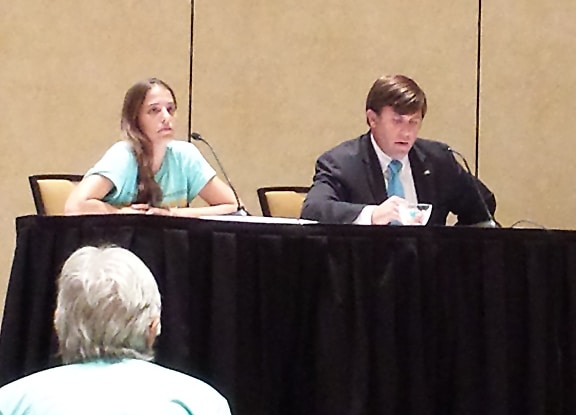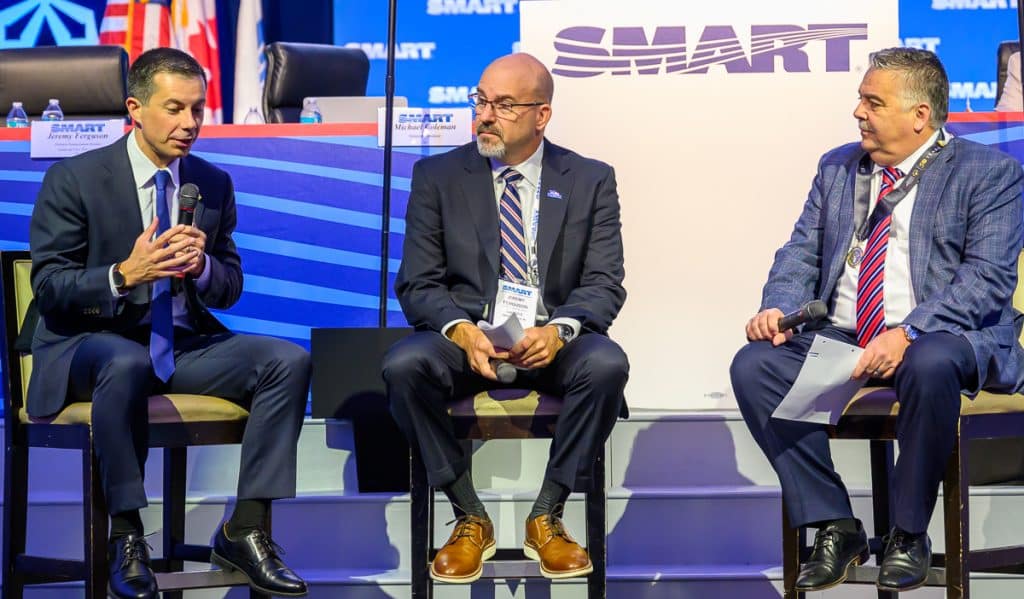
The 2023 SMART Leadership Conference concluded Wednesday, Aug. 2. The joint session featured a wide variety of pro-labor speakers and allies from Congress, the Biden administration and beyond, demonstrating the strength of our union’s relationships as we work to seize this moment of opportunity.
SMART Army award winners honored for practicing union values
Each year, SMART awards the Joseph J. Nigro SMART Army award to local union members who dedicate themselves to building their local SMART Armies and serving their union – and their communities.
A SMART-TD member and two sheet metal members from Canada and California were the latest honorees to be recognized by General President Michael Coleman.
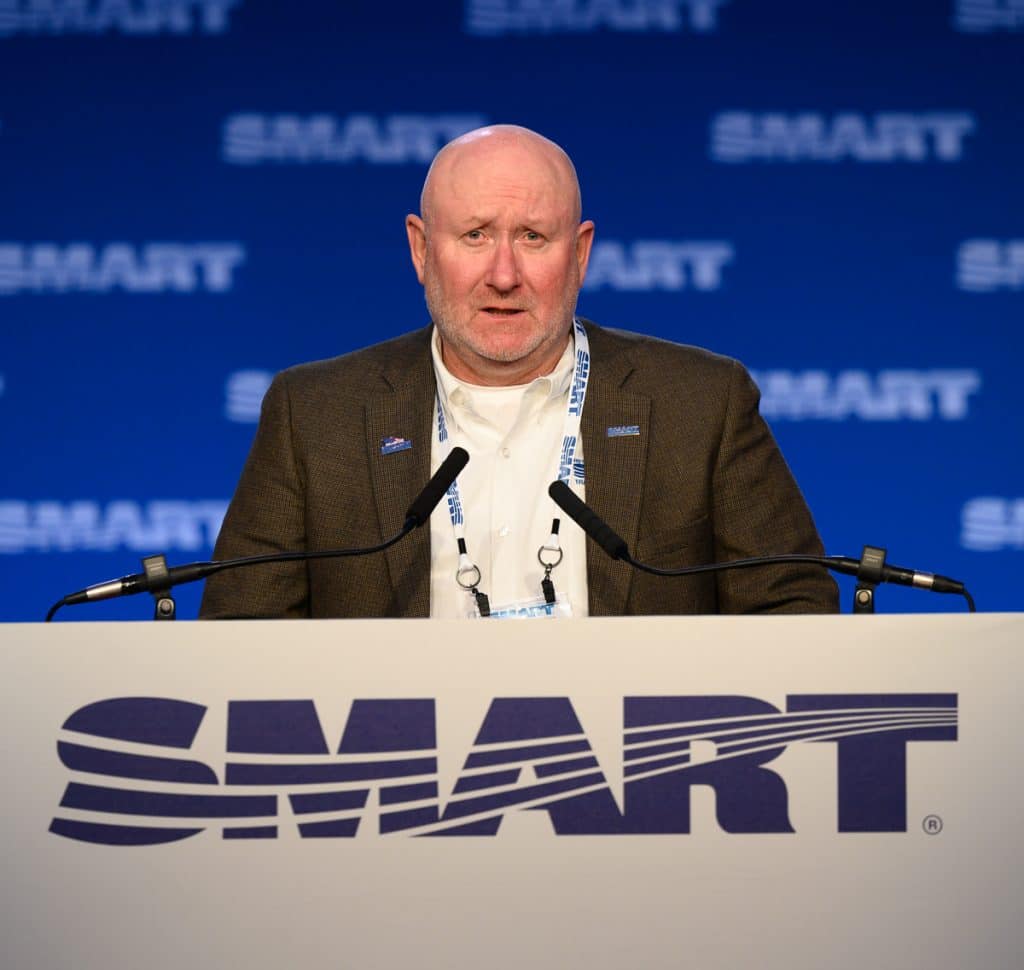
The first recipient, SMART-TD Local 1409’s (Kansas City, Kansas) Dan Bonawitz, Jr., accepted the honor with modesty, and he admitted he had some embarrassment at being singled out for his activism in safety, organizing for our union and helping honor fallen heroes.
The TD National Safety Team Alternate Director for the East Region and local legislative representative declared that it’s not an individual honor, but one that came as a result of the support system that the union provides, from his local level on up to the national headquarters.
“Nothing happens without an entire army, an entire team. I may be the schmuck up here speaking before you, but this is a collective effort,” he said, running down a long list of local, state and national officers and staff who helped reinforce and uplift his efforts.
GP Coleman presented Bonawitz with a railroad spike to symbolize his constant efforts to promote safety and bring together members of his local union.
Next, Coleman introduced sheet metal award winners Jeff Lind of SM Local 280 (British Columbia, Canada), and Manuel Zapata of SM Local 105 (Los Angeles, Calif.)
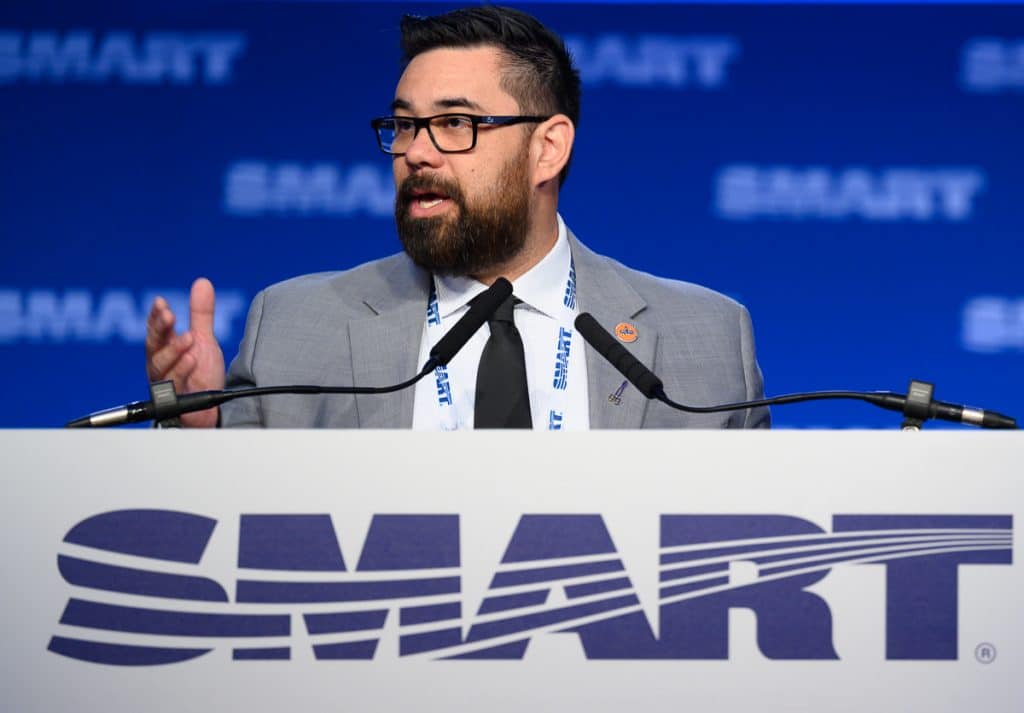
Lind, who helped create and craft the Local 280 SMART Army, has made the SMART Army both a place for members to come together and a place of service. Among the projects were the fabrication of metal tables for the local Meals on Wheels, volunteering for events like the Terry Fox Run for cancer research and much more.
“It’s an honor to accept this award, but really this is all about the membership of Local 280,” Lind said, thanking local leadership, his fellow Local 280 sisters and brothers and the members and leaders of SMART Canada.
Zapata, a longtime servant of Local 105, is the creator and leader of Autism Spectrum Athletics, a community organization in Los Angeles that provides a safe space for kids and families to play and socialize.
The organization started with 30 kids — it now has more than 140 participants playing sports including baseball, basketball, bowling, flag football and soccer.
“Brother Zapata exemplifies the values of our organization,” Coleman said.
“It’s an honor to be here, I’m truly humbled to be given this award. As a sheet metal worker, I’m as proud as I can be,” Zapata said, thanking Local 105, his wife and children while accepting his award.
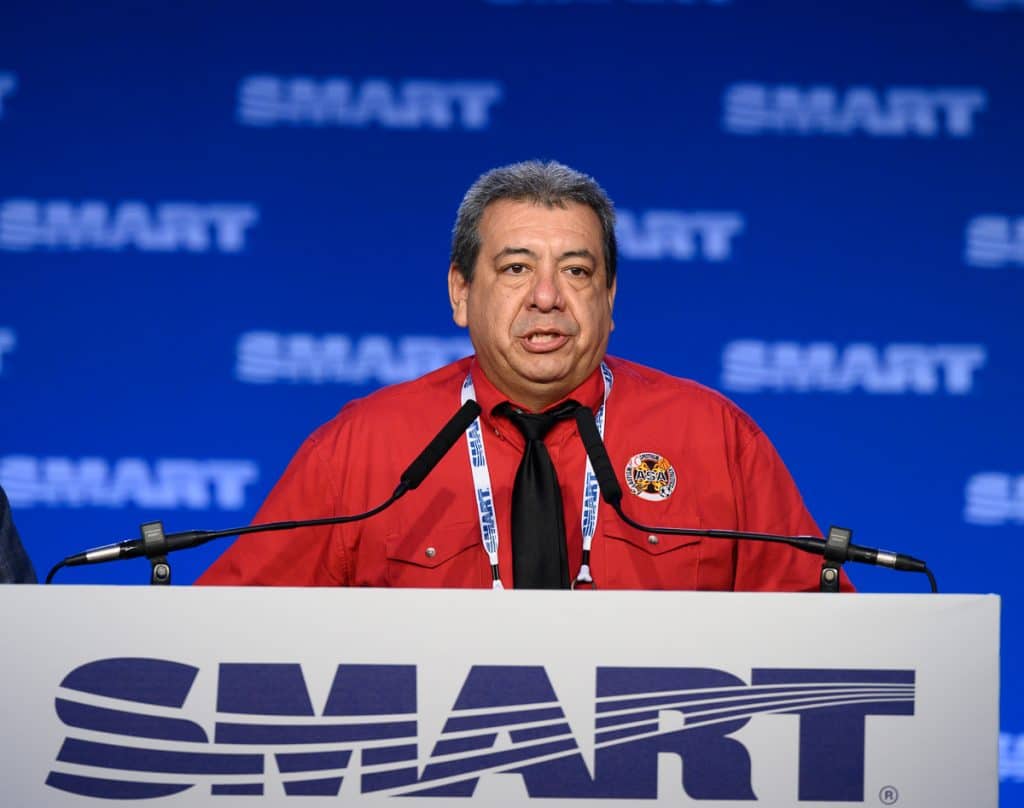
Following the SMART Army award presentation, SM Local 100 Business Manager Richie Labille joined GP Coleman for a truly inspiring announcement and demonstration of our union’s solidarity.
“I am proud to announce that the Maryland Special Olympics will receive $173,582 from us,” Coleman declared.
As a token of appreciation, Special Olympics of Maryland Global Ambassador and Coach Tim Gowen presented General President Coleman and Labille with medals.
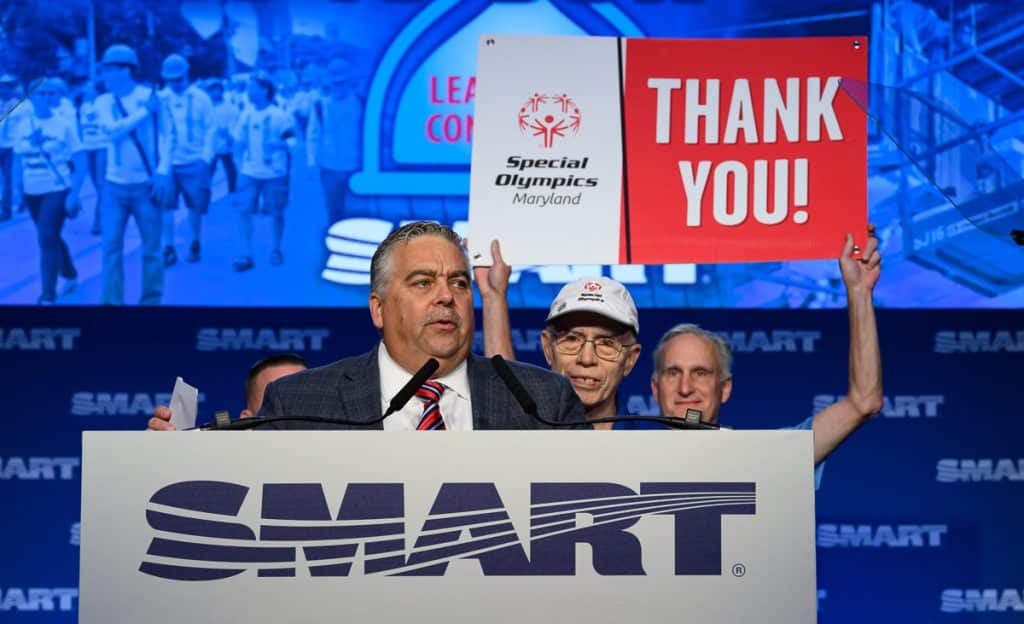
Visitors from Congress, Biden administration Cabinet
The joint session’s first visitor was pro-labor U.S. Rep. Madeleine Dean of Pennsylvania, who has worked to prioritize infrastructure funding and union jobs at the state and federal levels.
“I’ve been with you all along, you’ve been with me all along, so we have a very good partnership,” Dean said.
Dean, who is in her third term representing Pennsylvania’s fourth district, noted the extraordinary opportunity at hand to invest in America and do so by using union labor. Dean was instrumental in passing three transformation laws over the last several years: the Bipartisan Infrastructure Law, the CHIPS and Science Act and the Inflation Reduction Act. Those laws, she explained, will define America’s future: Updating our country’s infrastructure to build climate resiliency, investing in manufacturing to meet the demands of modern technology and more. Union labor, she said, will be essential for implementing all the investments in that federal legislation.
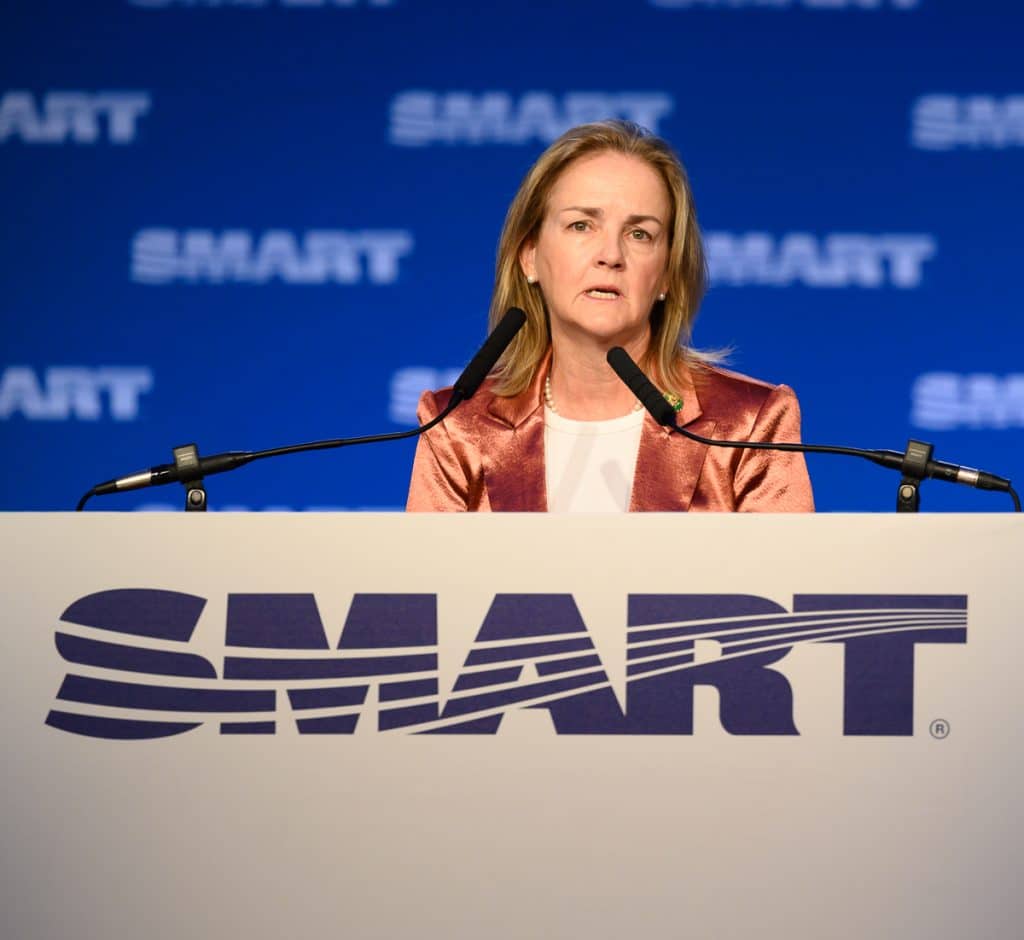
“These huge investments are reaching communities across the country, and that’s where we work with you,” she said.
“Those three bills are important to our nation and to how we will leave the world,” she added. “Your devotion to country, to your families is and has been good for America. It inspires me and my own work. I am grateful for the continued strength and contribution of America’s labor unions as we reimagine and reinvest in America’s future.”
Next, GP Coleman and Transportation Division President Jeremy R. Ferguson welcomed U.S. Department of Transportation Secretary Pete Buttigieg for the Leadership Conference’s first-ever “fireside chat,” during which the secretary answered questions from both presidents, engaging in a candid conversation on how the Bipartisan Infrastructure Law invests in transportation and union jobs; how our bus and transit operators need better on-the-job protections; and more.
Buttigieg described the test that faces both the Department of Transportation and the labor movement as funding continues to flow in from the Bipartisan Infrastructure Law. Passing the bill was one thing, he noted, but implementing and performing the work is the key. It’s an opportunity to reverse decades of disinvestment in our country and an opportunity to put skilled tradespeople to work.
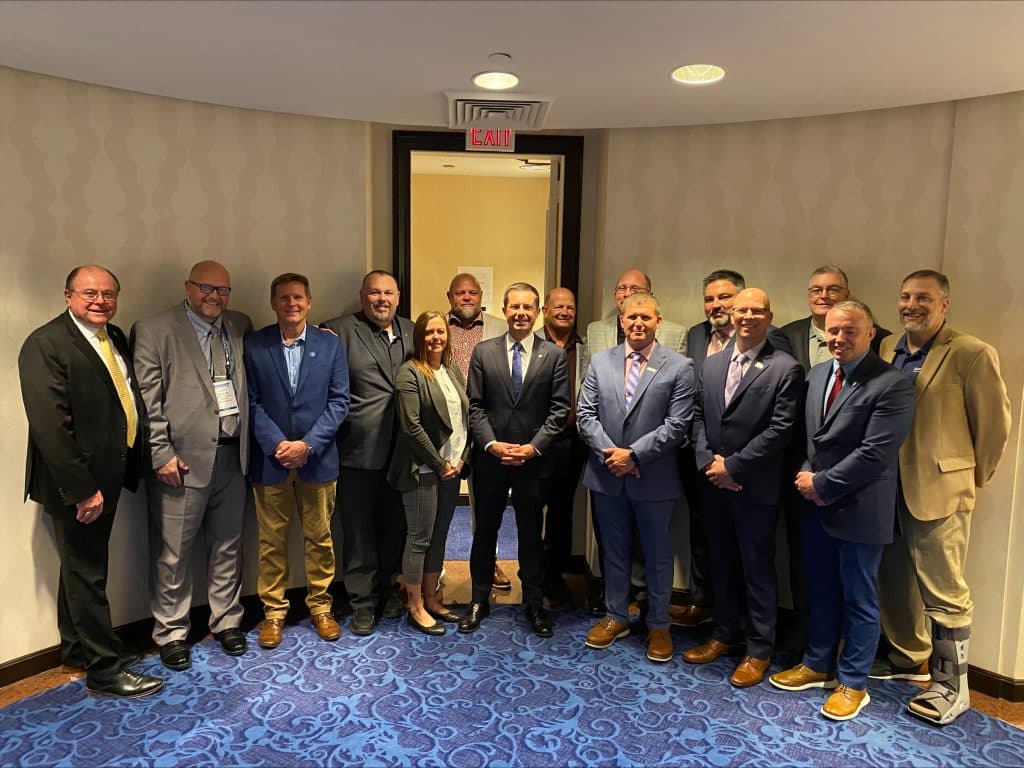
“Part of the idea was to create good-paying union jobs that are going to be the foundation of middle-class lives and livelihoods in the years ahead,” Buttigieg said. “This is a big test. Getting the bill done was one test. Now the bill got passed and the president signed it, we spent most of the last year expanding on these programs, including 45 major programs just at the DOT alone — some of them multi-billion-dollar programs.”
Coleman also asked Buttigieg about the work being created by federal funding – HVAC retrofitting, indoor air quality and more – and which organizations local unions should get in touch with to secure that work.
Federal funding from agencies like the Department of Transportation is often implemented by local bodies, from state governments to local airport authorities, and Buttigieg said that DOT is working closely with fellow agencies, like the Department of Labor and the EPA, to ensure that federal funding is creating good-paying, union jobs for SMART members.
“America is expecting a lot from all of us. Not only from this administration, but from the skilled trades in order to actually get these things done,” Buttigieg said. “This is an infrastructure decade, which means people can plan a career and plan to educate their kids and buy that house, and in that sense, we’re just getting started.”
President Ferguson asked Buttigieg about the ever-expanding length of trains on the railroad, and what DOT is doing to mitigate the effects of that, especially after a ProPublica and InvestigateTV report showed videos of children risking their lives, moving between and crawling under stopped trains to get to school.
“You can’t help but notice these trains, two miles long … three miles long, four miles long,” Buttigieg said. “Common sense tells you this is going to have an impact.”
To measure just what sort of impact, DOT is putting resources toward data collection and improving or eliminating rail crossings and more, Buttigieg said.
FRA also has resumed work on implementing a two-person crew law, opting not to wait for Congress to act but to undertake the steps available at the federal agency level to procure information for any future rulemaking and/or enforcement, he added.
Incidents involving attacks on SMART bus members in North Carolina and California – and on other unionized transit workers and bus operators – have escalated in their ferocity and frequency. Ferguson asked Buttigieg to describe what steps DOT is taking to protect bus and transit operators nationwide.
“The definition of an essential worker is one who makes it possible for other essential workers to get to work,” Buttigieg said. “We counted on transit operators in a way that was very visible during the first days of COVID. None of these assaults are acceptable.”
DOT, Buttigieg said, is working with local transit agencies and helping develop a regulatory process that would empower workers in the process of developing safety protocols that protect operators.
“It is a danger to the operators, it’s a danger to the traveling public,” Buttigieg said. “We are not going to let this go until there are zero assaults.”
Finally, Ferguson read a question submitted by a SMART-TD member, who asked what DOT is doing to gather information from workers and to address safety concerns on the railroad.
Buttigieg, noting that the last presidential administration’s rulemaking process included scant input from workers, urged the Transportation Division and its members to continue taking advantage of procedural measures like public commenting on notices of proposed rulemaking. He also listed steps DOT is taking to ensure commitment from the Class I carriers to participate in the Confidential Close Call Reporting System (3CRS) and to enforce that commitment, and said his agency has been ordered to actively seek labor’s input through open dialogue.
“All of that connective tissue in an administration that, not that I wouldn’t do this anyway, has very clear directions from the very top to make sure we never miss an opportunity to get the input, the views and concerns of workers into all of our processes, official and informal, so we really understand safety from the people who have the most at stake and the people who know the best,” he said.
Educating future workers
U.S. Secretary of Education Miguel Cardona spoke next, addressing how the Department of Education partnered with SMART on issues like indoor air quality and reopening schools in the midst of the pandemic. He also talked about how the Department of Education is shifting focus away from the idea that a four-year undergraduate degree is the only path forward for young people.
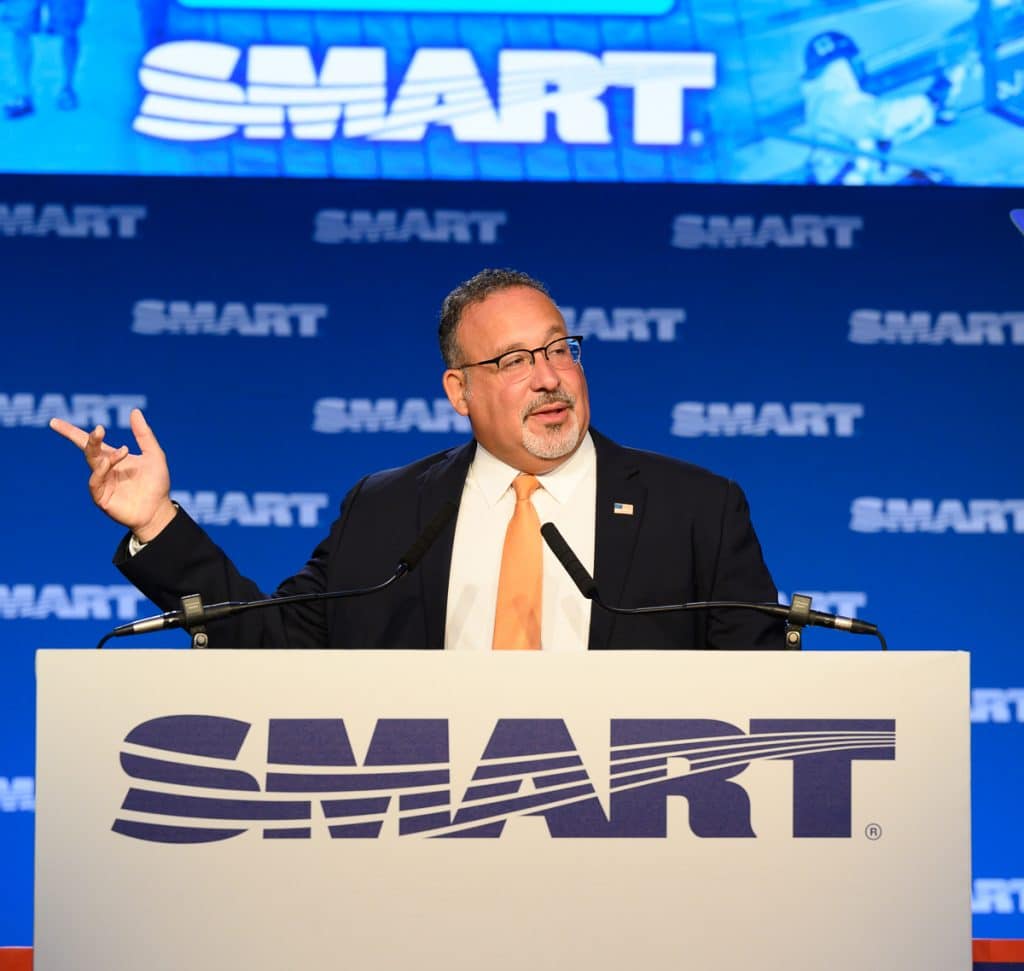
“Union workers don’t just get the job done. They get the job done right. That’s because union workers are highly skilled workers,” Cardona said.
Echoing Rep. Dean, Cardona pointed out that the Bipartisan Infrastructure Law, the Inflation Reduction Act and the CHIPS and Science Act are creating millions of jobs, including for SMART members, and the country is going to need skilled people to fill them.
“We have a job tsunami on the horizon. Career opportunities that will support families, strengthen communities, and fuel America’s competitiveness for decades to come,” he said. “If we don’t prepare our young people for these careers – then shame on us! If we don’t fundamentally change our high schools to make sure we have pathways to these high skill-high paying careers, then we are failing our kids.”
SMART, Cardona noted, is already doing the work by partnering with high schools and CTEs everywhere from Idaho to Georgia to bring young people into the trade.
Cardona pledged to lead a Department of Education that partners with organized labor to continue that progress; that creates pipelines into the trades that benefit SMART, students and communities as they work to transform U.S. high schools and treat trade education and college as options of equal weight to grow a future career.
Labor secretaries past and current
Former U.S. Labor Secretary and National Hockey League Players Association Executive Director Marty Walsh next received a warm welcome as a fellow member of the labor movement. Walsh gave two shout-outs to start his speech: General President Emeritus Joseph Sellers, and Local 17 President Robert Butler, who, Walsh said, “has been with me in every race I’ve ever run.”
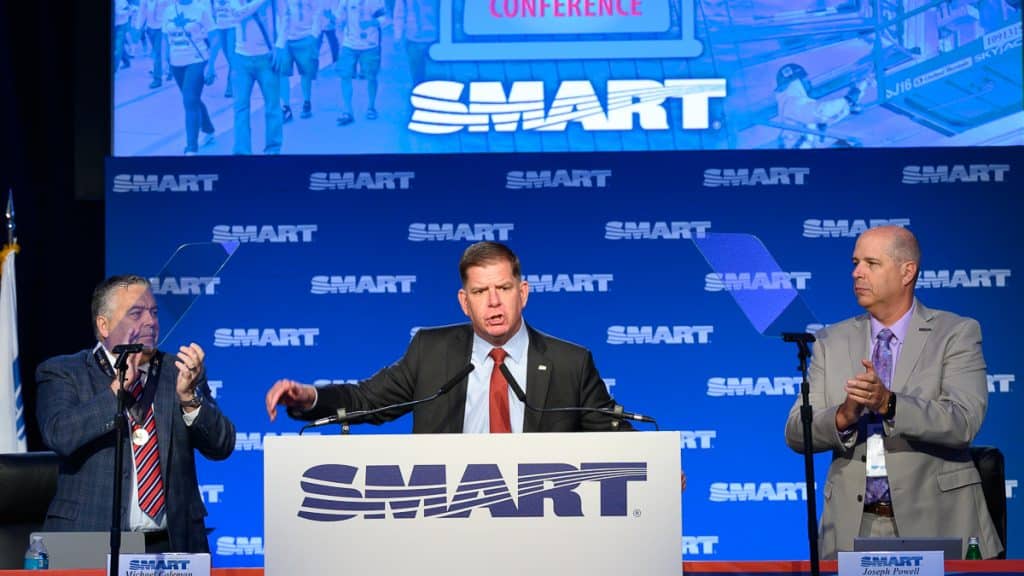
He also offered his condolences for the passing of General Vice President John D. Whitaker III and TD General Chairperson Gerald Wallace, noting that any loss to our union family is a tragic one.
Walsh then got into the meat of his speech, which focused primarily on one theme: Elections have consequences. There’s nothing more important, he said, than making sure elected officials support union workers, understand our value, understand what we do and act on our behalf. That’s how pro-labor policy is made – and that’s how we create an economy that works for SMART members.
“The labor movement is the greatest force for economic justice that’s ever existed,” Walsh said.
As Labor Secretary, he added, he was proud to work for a pro-labor administration in President Joe Biden and Vice President Kamala Harris.
The American Rescue Plan, he said, put working families back on the job and reopened the economy. While the last presidential administration talked about passing an infrastructure bill, this one actually did it with the Bipartisan Infrastructure Law. The CHIPS Act is bringing manufacturing back home – when fully implemented, Walsh noted, it will create hundreds of thousands of new jobs. And the Inflation Reduction Act is creating green energy jobs to combat the climate crisis and lower costs for working families.
All of that can only happen, he reiterated, when unions work with pro-labor elected officials to make it happen.
“We stand on the shoulders of the founders of our local unions,” Walsh said. “It’s our obligation to continue what they started so the next generation has the same opportunity. That’s why elections matter.”
During his time as labor secretary, Walsh said, the Department of Labor worked to make sure labor protections, the right to join a union, project labor agreements and pathways to the trades were included in federal investments.
“We’re investing in today’s union jobs. We’re investing in tomorrow’s union jobs, and we’re investing in our retirees as well,” Walsh said.
Unemployment has been brought down to levels not seen since the 1960s. That strategy is part of a move away from decades of trickle-down economics, replaced by an economy built from the bottom up and the middle out, he said.
“We didn’t get a drop of the trickle,” Walsh said. “And only because organized labor was able to save what was left of the middle class, otherwise we wouldn’t have a middle class in this country.”
Now, he said, union members need to spread the message far and wide – both to their communities and to their fellow members – to make sure working families are voting for candidates who act on their behalf.
Finally, he talked about the importance of confirming Acting Labor Secretary Julie Su.
“I want you to know that she has your back, just like I had your back. Brothers and sisters, I will always stand with you,” he concluded.
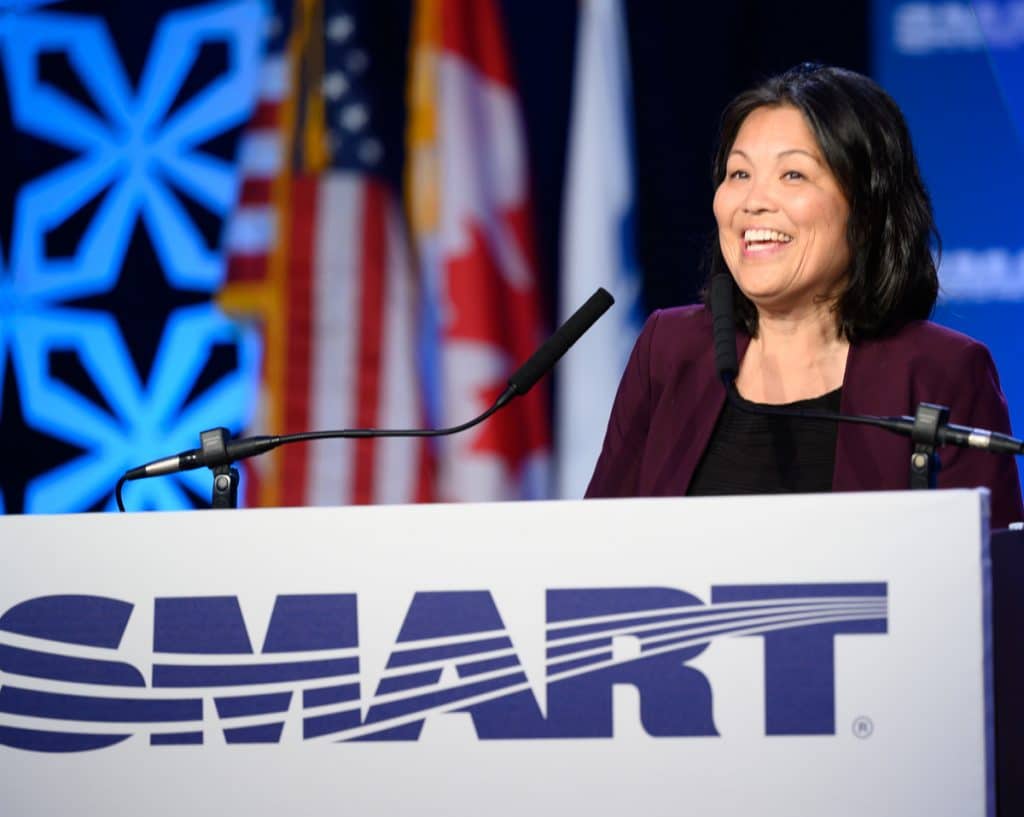
Su was next up in the joint session, with GP Coleman declaring: “We will not rest until she has won her confirmation as labor secretary in the U.S. Senate.”
Su stated that she was here, with SMART and in her place at the Department of Labor, to finish the good work that she and Secretary Walsh started. To demonstrate the importance of a union career, she told the story of recently retired Local 28 member Leah Rambo, who now works in the Department of Labor Women’s Bureau.
“Leah’s career as a SMART sheet metalworker gave her a life she couldn’t have imagined for herself — homeownership, pension, a pathway to middle class,” Su said. “Today, I am so proud to work alongside Leah at the Department of Labor, where she is part of our women’s bureau and pays it forward every single day by making sure we are connecting people, including women, to jobs across the country.”
As the entire theme of this conference demonstrates, these are historic times, she said. But federal investments don’t turn into good, union jobs by accident – that’s the work that the Department of Labor and unions like SMART must perform to build an economy that is truly pro-worker.
At the DOL, Su said, that takes several forms. First — empowering and educating workers in everything the department does, putting workers at the center of the agenda, supporting workers’ rights to organize and the collective bargaining process.
“We see workers’ ability to demand more at the bargaining table not as a threat, but as a critical tool to advance and build a strong economy,” she said.
Second — equity. Embedding equity in everything the department does, including in the federal investments going out.
Third — Enforcement. Using every tool available at the DOL to combat wage theft, protect pensions, and more. Part of that work, Su noted, is having the department update Davis-Bacon laws, for the first time in 40 years.
“Marty started that, now we’re going to finish it,” she declared.
Su’s mission, she said, is to fundamentally change the American workforce so that everyone can get ahead; so that every community has the opportunity to gain a pathway into the middle class.
“We need to build the bridge from poverty to prosperity … the bridge that families need to the middle class,” she said. “This is our time, this is your time, so let’s build together.”
Commerce and climate crisis poised to define future jobs
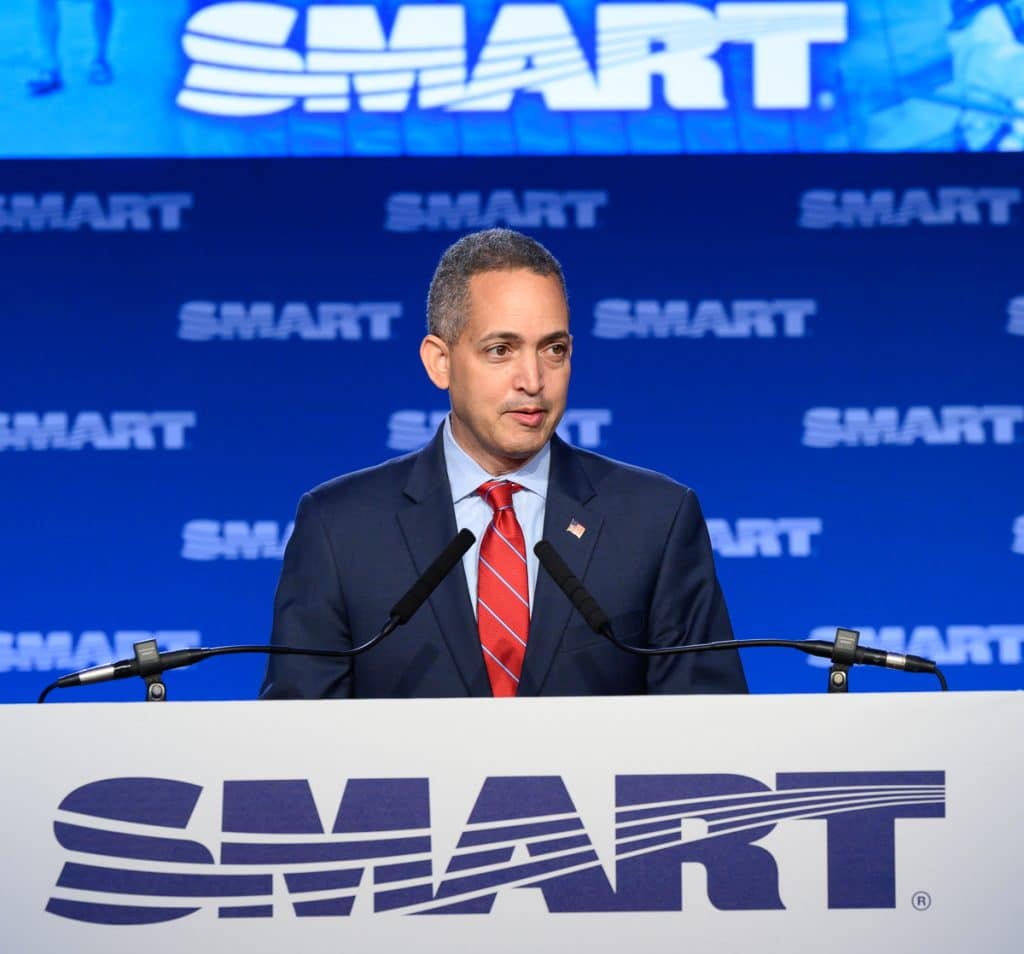
Deputy Secretary of Commerce Don Graves visited the joint session to update attendees on the work that the Department of Commerce is doing to help create an economy for and by working people.
“There’s great things happening all across the country,” he said. “As you all know, the work of you and your members is integral to the infrastructure of our country.”
The Biden administration’s “Investing in America” agenda is making the once-in-a-generation investments that we should have been making for decades, Graves said.
“We believe that SMART members are going to be at the forefront of that work.”
Most people think of the Department of Commerce as the Department of Business. Under this administration, he explained, it’s the “Department of People, Communities, and American Workers.” Along with Secretary Raimondo, Graves added, he is working to distribute billions of dollars in federal funding with the goal of American competitiveness – so SMART members, union workers and communities thrive. CHIPS funding alone, he noted, will spur hundreds of billions of dollars in private capital investment, creating thousands of union jobs and sparking the recruitment and retention of a diverse skilled workforce.
“The construction jobs we’re going to create are going to change lives.”
Under President Biden’s direction, he said, the Department of Commerce is calling on companies and contractors to work with unions, requiring companies to submit workforce development plans that allow workers the freedom to organize.
“Every project using these funds needs to pay prevailing wages,” Graves declared, adding that the Department of Commerce will continue to work with SMART moving ahead. “Thank you for your leadership, thank you for your partnership, and thank you for pushing us.”
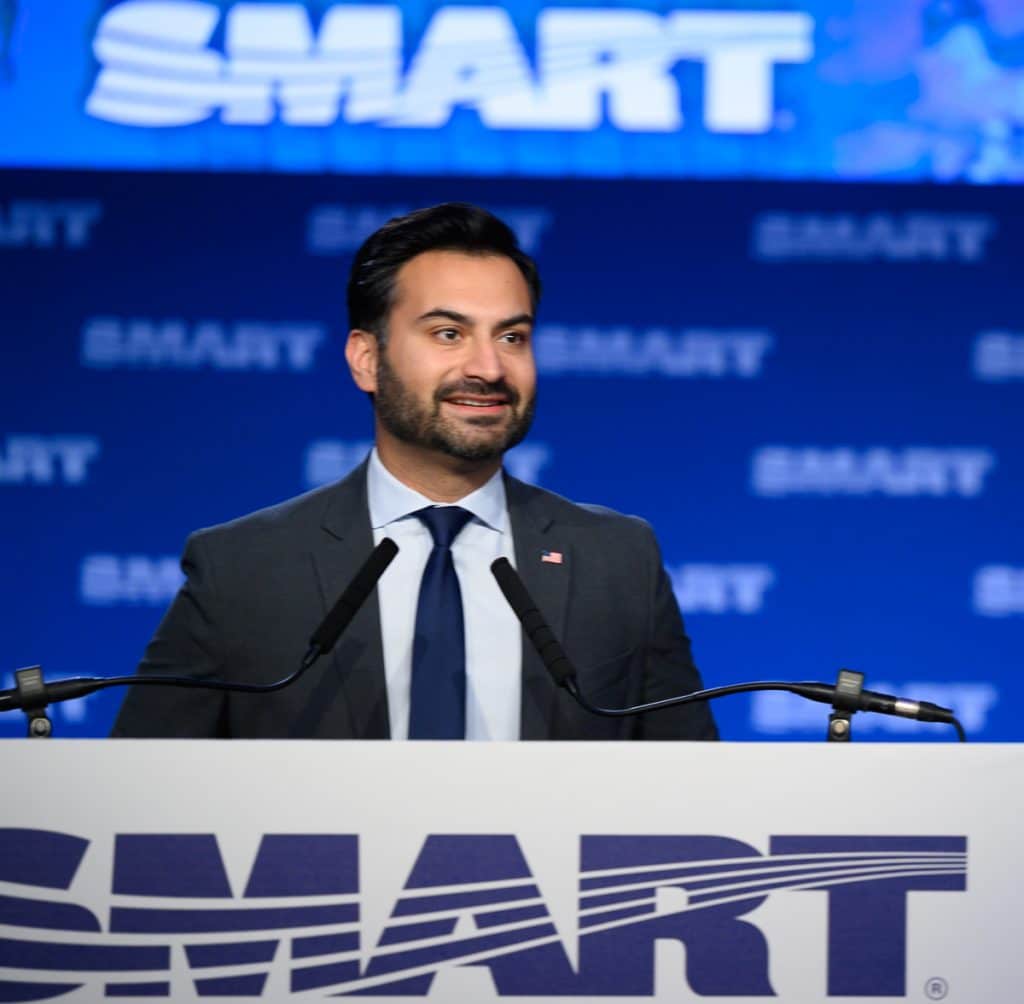
The joint session’s final speaker was White House Climate Advisor Ali Zaidi, who discussed the progress that SMART has made in making it known that green jobs – like those in energy efficiency and public transit – are real jobs and good, union jobs that tackle the climate crisis while bringing people into the middle class.
“This is the essential part of the transformation that we seek,” he said. “We’ve got the solutions – now we’ve got the workers that will build those electric buses that will hit the road across the country. … It’s because of your membership that we’re able to get that done, not just in a way that deploys that technology, but in a way that builds it in the United States.”
If we only go from a dirty energy economy to a clean energy economy, we will have missed the moment, Zaidi said. We can’t just lift ourselves to a clean energy economy. This has to be a moment where we lift up the middle class and inspire a manufacturing renaissance.
“Folks, we’re doing that,” he declared, citing the 800,000 manufacturing jobs created by the Biden administration. “You all are the engine that’s driving us forward to not just a strong economy, but a clean energy economy.”
There are huge workforce needs in the clean energy space, Zaidi said, pointing to the work that SMART is doing to diversify and expand the pool of workers being brought into our union.
By growing the labor movement and combating the climate crisis simultaneously, he concluded, we can create a green energy future that works for all.
“I’m so optimistic about our chances, because you are the ones on the front lines.”
Then, for the last time, sheet metal and Transportation Division union leaders parted ways, bringing an end to joint activity at a productive and educational leadership conference.
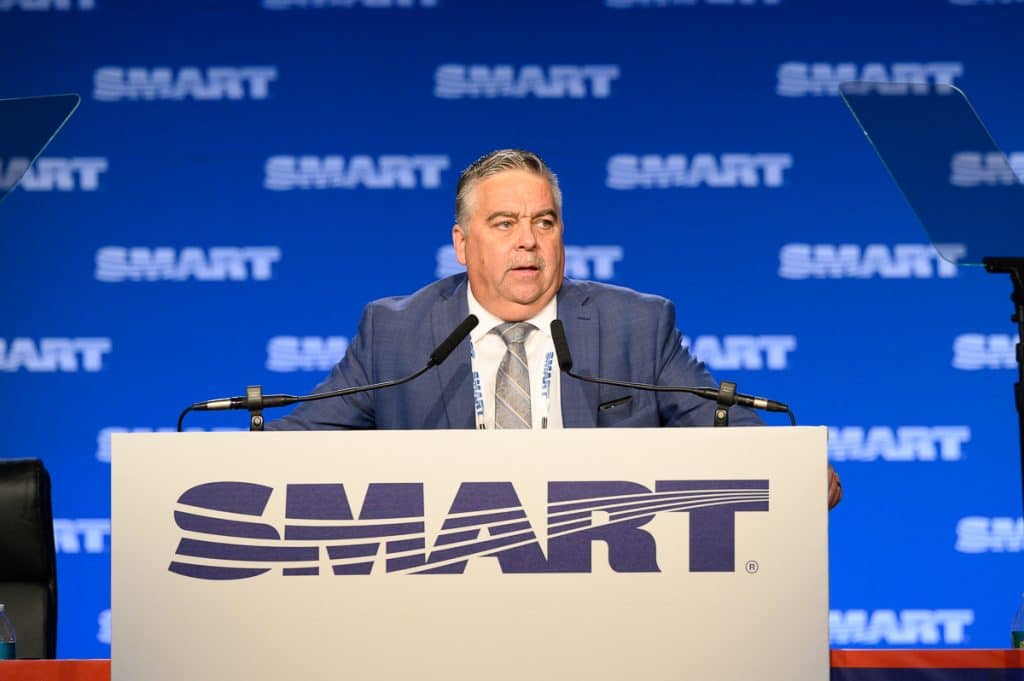
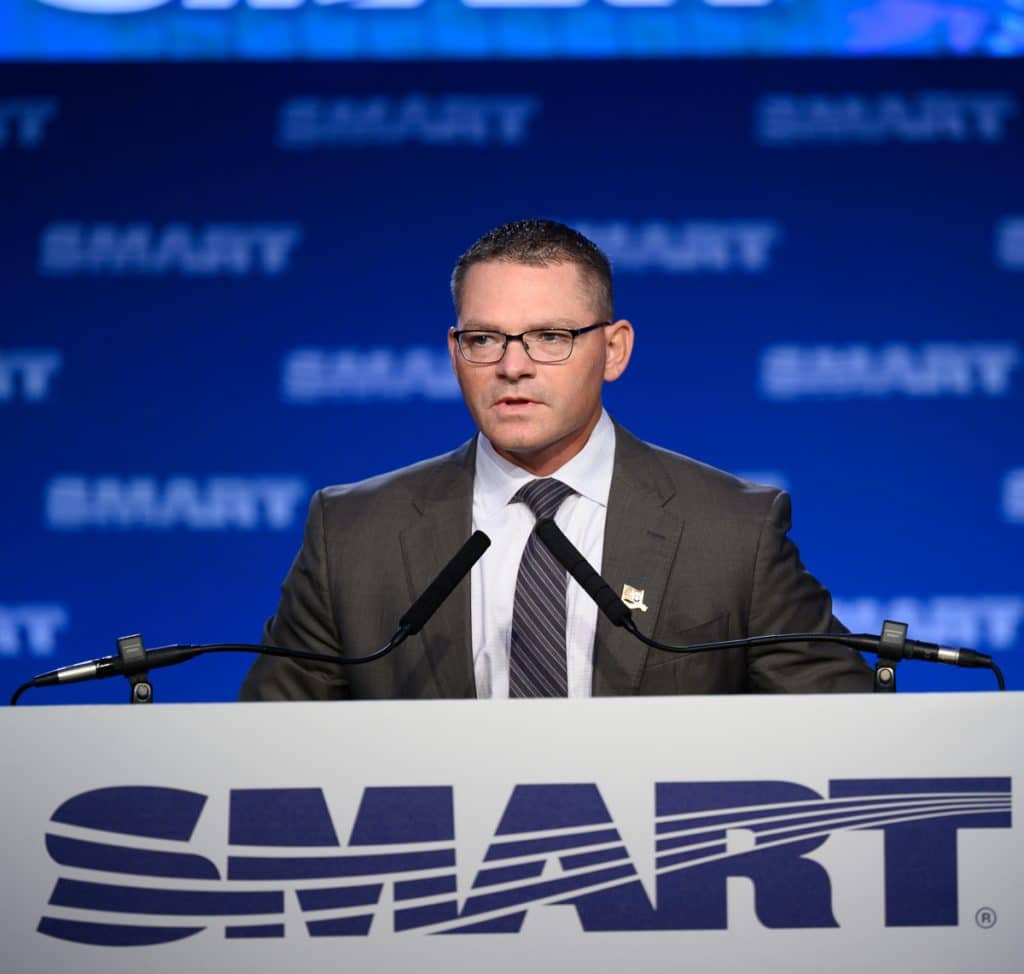
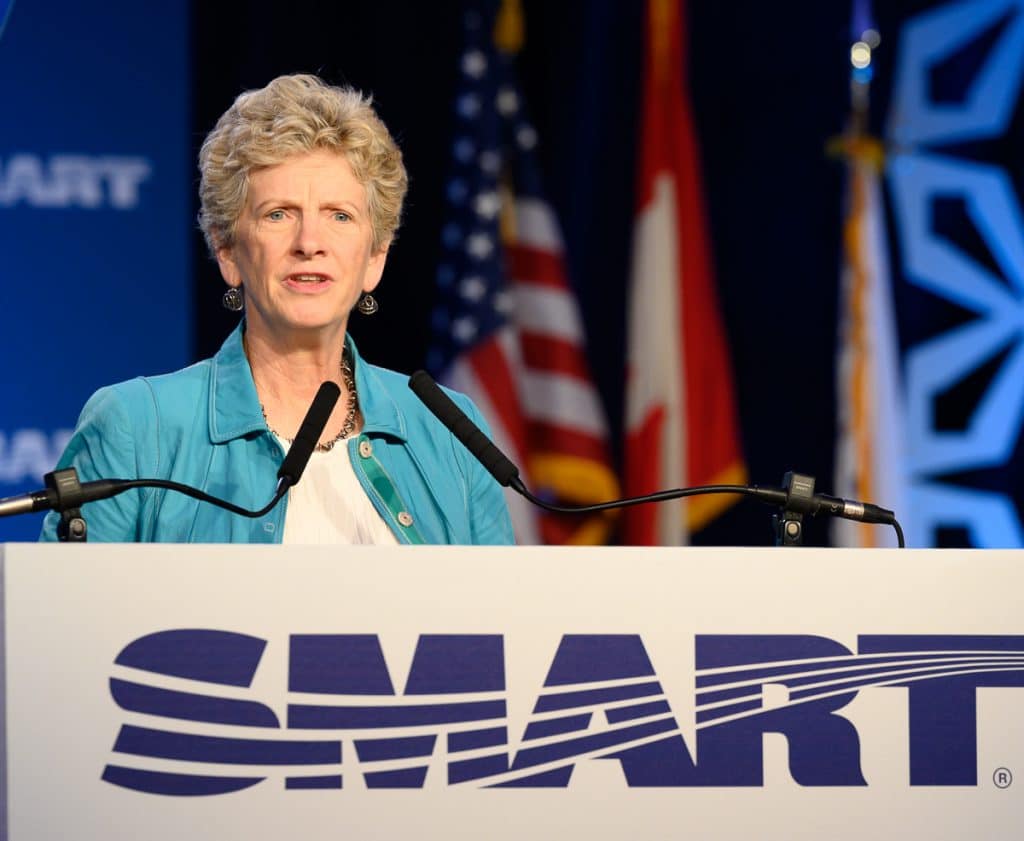
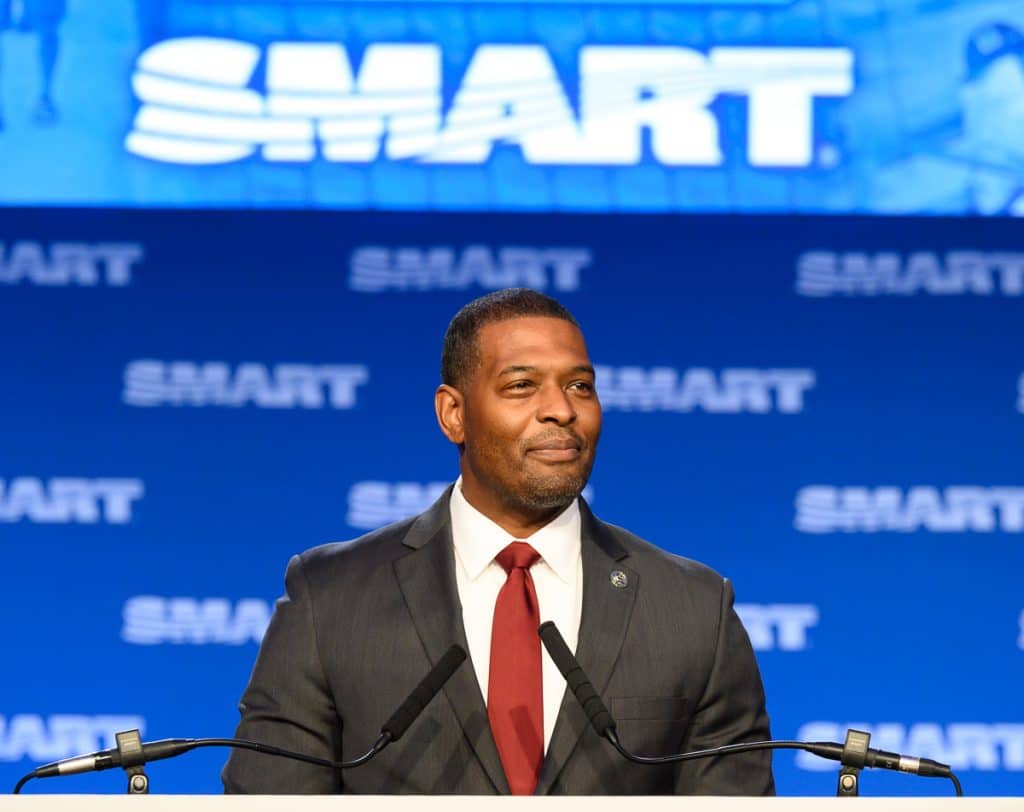
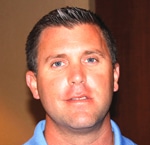
 Pennsylvania State Legislative Director Paul Pokrowka is asking all SMART Transportation Division members from Pennsylvania to take action and contact the office of Gov. Tom Corbett, requesting he sign House Bill 2354 into law.
Pennsylvania State Legislative Director Paul Pokrowka is asking all SMART Transportation Division members from Pennsylvania to take action and contact the office of Gov. Tom Corbett, requesting he sign House Bill 2354 into law.